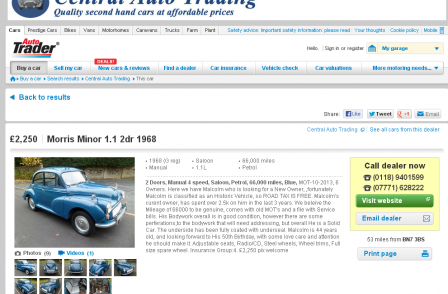
Going digital-only was once seen as a last desperate throw of the dice for a dying print brand. But not any more. (Declaration of interest: Press Gazette went digital-only at the end of last year)
Take Auto Trader as a for-instance. If anyone was going to be sunk by the rise of digital media it was a magazine based almost purely on classified motor vehicle advertising. For those who haven’t noticed – the advertising of cars, houses and jobs has now moved largely online, with devastating consequences for newspapers (and to a lesser extent magazines) large and small.
Trader Media Group (joint owned by Guardian News and Media and Apax) is the ultimate example of how an old-fashioned print business can not only survive but thrive in the digital age.
Back in 2000 Auto Trader was selling 368,000 copies a week and helping Trader Media achieve revenues of £220m a year. (It was an early adopter to online by the way and at that point claimed to be attracting 28m ‘page impressions’ a month.)
In 2005/2006 (reckoned by many to be around the high water-mark of print newspaper profitability in the UK) it reported turnover of £303.3m and delivered an operating profit of £119.5m. (By this stage it was attracting 6.6 million unique users to its website a month).
Last week Trader Media Group announced that its dwindling print edition would be scrapped at the end of June. At last count it sold 27,000 copies a week compared with claimed website traffic of 11m unique visitors a month.
In the financial year to April 2012, Trader Media Group achieved turnover of £257.2m and an EBITDA profit figure of £142.9m.
Now the profit figures may not be directly comparable. But nonetheless, I would be surprised if any other big media brand can claim to be actually making more money today than they did in 2005. Apart from the little matter of digital disruption we are now five years in to the biggest media downturn in history.
Auto Trader has succeeded by being the very best at what it does. Its free-to-air website is supercharged with an array of digital tools which make it the perfect place to buy and sell your car.
Ebay has made some in-roads into this market, but most of us still feel that a decision on which car to buy is too important to trust to a general auction website. So the market is still dominated by Auto Trader and the other specialist sites.
Auto Trader succeeded by remembering that it wasn't in the magazine business, it was in the motors business.
It's worth noting that Auto Trader does a lot more than just sell cars nowadays. It collects a huge amount of data from its readers which is hugely valuable to car dealers (such as what cars people are buying and how much they are paying for them in different parts of the country). It also provides consultancy services helping car dealers set up and run their own websites.
I’m sure Auto Trader has been enormously helped in its move to becoming a digital-only business by the print heritage which made it a trusted brand. Its success shows that you don’t always swap print pounds for digital pennies when you move from being a paid-for newspaper or magazine to a free website.
The downside of all this is that many sub-editors and production staff have lost their jobs as Auto Trader’s print edition has dwindled over the years to be finally extinguished next month.
Out of 1350 staff, up to 150 could lose their jobs as a result of the end of the print edition.
Thousands of journalists have lost their jobs as a result of movement of classified advertising from print to online which Auto Trader has cashed in on.
Editorial journalism has never been a big part of the mix for Auto Trader. Nowadays it employs around 10 writers working purely online (though it is worth noting that around 550 Guardian News and Media journalists have Trader Media to thank for offsetting a large part of their employer's ongoing losses).
But journalism businesses can still learn a lot from an old media brand which has been uniquely successful at navigating the switch from print to digital. For more on this, see this Friday's Press Gazette – Journalism Weekly (to subscribe for free fill in your details here).
Email pged@pressgazette.co.uk to point out mistakes, provide story tips or send in a letter for publication on our "Letters Page" blog
